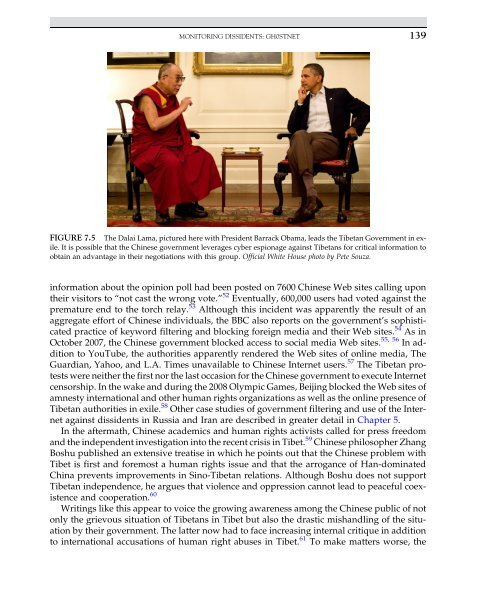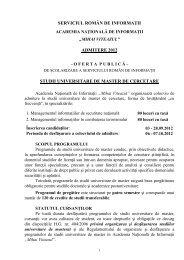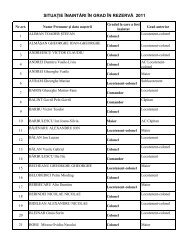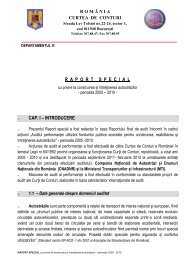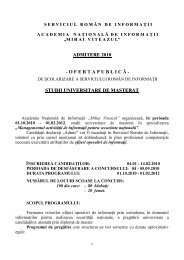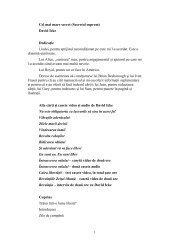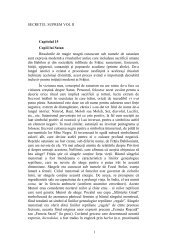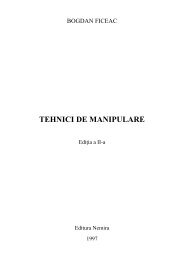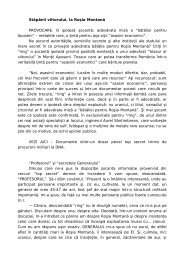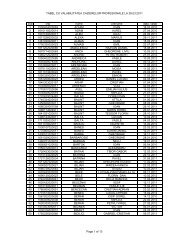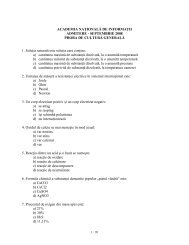- Page 2 and 3:
INTRODUCTION TOCYBER-WARFARE
- Page 4 and 5:
INTRODUCTIONTO CYBER-WARFAREA Multi
- Page 6 and 7:
ContentsPreface ixForeword xiIntrod
- Page 8 and 9:
CONTENTSviiHow Real-World Dependenc
- Page 10 and 11:
PrefaceSince Stuxnet emerged in 201
- Page 12 and 13:
ForewordThe concept of cyber warfar
- Page 14 and 15:
IntroductionIt is 2006. An American
- Page 16 and 17:
INTRODUCTIONxvinfamous hacking grou
- Page 18 and 19:
BiographyPaulo Shakarian, Ph.D. is
- Page 20 and 21:
C H A P T E R1Cyber Warfare: Here a
- Page 22 and 23:
IS CYBER WAR A CREDIBLE THREAT?3sec
- Page 24 and 25:
ATTRIBUTION, DECEPTION, AND INTELLI
- Page 26 and 27:
INFORMATION ASSURANCE74. Time: Temp
- Page 28 and 29:
P A R T ICYBER ATTACKInformation ha
- Page 30 and 31:
C H A P T E R2Political Cyber Attac
- Page 32 and 33:
RUDIMENTARY BUT EFFECTIVE: DENIAL O
- Page 34 and 35:
THE DIFFICULTY OF ASSIGNING BLAME:
- Page 36 and 37:
ESTONIA IS HIT BY CYBER ATTACKS17FI
- Page 38:
ESTONIA IS HIT BY CYBER ATTACKS19Th
- Page 41 and 42:
22 2. POLITICAL CYBER ATTACK COMES
- Page 43 and 44:
24 3. HOW CYBER ATTACKS AUGMENTED R
- Page 45 and 46:
26 3. HOW CYBER ATTACKS AUGMENTED R
- Page 47 and 48:
28 3. HOW CYBER ATTACKS AUGMENTED R
- Page 49 and 50:
30 3. HOW CYBER ATTACKS AUGMENTED R
- Page 51 and 52:
32 3. HOW CYBER ATTACKS AUGMENTED R
- Page 53 and 54:
34 4. CYBER AND INFORMATION OPERATI
- Page 55 and 56:
36 4. CYBER AND INFORMATION OPERATI
- Page 57 and 58:
38 4. CYBER AND INFORMATION OPERATI
- Page 59 and 60:
40 4. CYBER AND INFORMATION OPERATI
- Page 61 and 62:
42 4. CYBER AND INFORMATION OPERATI
- Page 63 and 64:
44 5. CYBER ATTACK AGAINST INTERNAL
- Page 65 and 66:
46 5. CYBER ATTACK AGAINST INTERNAL
- Page 67 and 68:
48 5. CYBER ATTACK AGAINST INTERNAL
- Page 69 and 70:
50 5. CYBER ATTACK AGAINST INTERNAL
- Page 71 and 72:
52 5. CYBER ATTACK AGAINST INTERNAL
- Page 73 and 74:
54 5. CYBER ATTACK AGAINST INTERNAL
- Page 75 and 76:
56 5. CYBER ATTACK AGAINST INTERNAL
- Page 77 and 78:
58 5. CYBER ATTACK AGAINST INTERNAL
- Page 79 and 80:
60 5. CYBER ATTACK AGAINST INTERNAL
- Page 81 and 82:
62 5. CYBER ATTACK AGAINST INTERNAL
- Page 83 and 84:
64 5. CYBER ATTACK AGAINST INTERNAL
- Page 85 and 86:
66 5. CYBER ATTACK AGAINST INTERNAL
- Page 87 and 88:
68 6. CYBER ATTACKS BY NONSTATE HAC
- Page 89 and 90:
70 6. CYBER ATTACKS BY NONSTATE HAC
- Page 91 and 92:
72 6. CYBER ATTACKS BY NONSTATE HAC
- Page 93 and 94:
74 6. CYBER ATTACKS BY NONSTATE HAC
- Page 95 and 96:
76 6. CYBER ATTACKS BY NONSTATE HAC
- Page 97 and 98:
78 6. CYBER ATTACKS BY NONSTATE HAC
- Page 99 and 100:
80 6. CYBER ATTACKS BY NONSTATE HAC
- Page 101 and 102:
82 6. CYBER ATTACKS BY NONSTATE HAC
- Page 103 and 104:
84 6. CYBER ATTACKS BY NONSTATE HAC
- Page 105 and 106:
86 6. CYBER ATTACKS BY NONSTATE HAC
- Page 107 and 108: 88 6. CYBER ATTACKS BY NONSTATE HAC
- Page 109 and 110: 90 6. CYBER ATTACKS BY NONSTATE HAC
- Page 111 and 112: 92 6. CYBER ATTACKS BY NONSTATE HAC
- Page 113 and 114: 94 6. CYBER ATTACKS BY NONSTATE HAC
- Page 115 and 116: 96 6. CYBER ATTACKS BY NONSTATE HAC
- Page 117 and 118: 98 6. CYBER ATTACKS BY NONSTATE HAC
- Page 119 and 120: 100 6. CYBER ATTACKS BY NONSTATE HA
- Page 121 and 122: 102 6. CYBER ATTACKS BY NONSTATE HA
- Page 123 and 124: 104 6. CYBER ATTACKS BY NONSTATE HA
- Page 125 and 126: 106 6. CYBER ATTACKS BY NONSTATE HA
- Page 127 and 128: 108 6. CYBER ATTACKS BY NONSTATE HA
- Page 129 and 130: 110 6. CYBER ATTACKS BY NONSTATE HA
- Page 131 and 132: Intentionally left as blank
- Page 133 and 134: 114 7. WHY CYBER ESPIONAGE IS A KEY
- Page 135 and 136: 116 7. WHY CYBER ESPIONAGE IS A KEY
- Page 137 and 138: 118 7. WHY CYBER ESPIONAGE IS A KEY
- Page 139 and 140: 120 7. WHY CYBER ESPIONAGE IS A KEY
- Page 141 and 142: 122 7. WHY CYBER ESPIONAGE IS A KEY
- Page 143 and 144: 124 7. WHY CYBER ESPIONAGE IS A KEY
- Page 145 and 146: 126 7. WHY CYBER ESPIONAGE IS A KEY
- Page 147 and 148: 128 7. WHY CYBER ESPIONAGE IS A KEY
- Page 149 and 150: 130 7. WHY CYBER ESPIONAGE IS A KEY
- Page 151 and 152: 132 7. WHY CYBER ESPIONAGE IS A KEY
- Page 153 and 154: 134 7. WHY CYBER ESPIONAGE IS A KEY
- Page 155 and 156: 136 7. WHY CYBER ESPIONAGE IS A KEY
- Page 157: 138 7. WHY CYBER ESPIONAGE IS A KEY
- Page 161 and 162: 142 7. WHY CYBER ESPIONAGE IS A KEY
- Page 163 and 164: 144 7. WHY CYBER ESPIONAGE IS A KEY
- Page 165 and 166: 146 7. WHY CYBER ESPIONAGE IS A KEY
- Page 167 and 168: 148 7. WHY CYBER ESPIONAGE IS A KEY
- Page 169 and 170: 150 7. WHY CYBER ESPIONAGE IS A KEY
- Page 171 and 172: 152 7. WHY CYBER ESPIONAGE IS A KEY
- Page 173 and 174: 154 7. WHY CYBER ESPIONAGE IS A KEY
- Page 175 and 176: 156 7. WHY CYBER ESPIONAGE IS A KEY
- Page 177 and 178: Intentionally left as blank
- Page 179 and 180: 160 8. DUQU, FLAME, GAUSS, THE NEXT
- Page 181 and 182: 162 8. DUQU, FLAME, GAUSS, THE NEXT
- Page 183 and 184: 164 8. DUQU, FLAME, GAUSS, THE NEXT
- Page 185 and 186: 166 8. DUQU, FLAME, GAUSS, THE NEXT
- Page 187 and 188: 168 8. DUQU, FLAME, GAUSS, THE NEXT
- Page 189 and 190: 170 8. DUQU, FLAME, GAUSS, THE NEXT
- Page 191 and 192: 172 9. LOSING TRUST IN YOUR FRIENDS
- Page 193 and 194: 174 9. LOSING TRUST IN YOUR FRIENDS
- Page 195 and 196: 176 9. LOSING TRUST IN YOUR FRIENDS
- Page 197 and 198: 178 9. LOSING TRUST IN YOUR FRIENDS
- Page 199 and 200: 180 9. LOSING TRUST IN YOUR FRIENDS
- Page 201 and 202: 182 9. LOSING TRUST IN YOUR FRIENDS
- Page 203 and 204: Intentionally left as blank
- Page 205 and 206: 186 10. INFORMATION THEFT ON THE TA
- Page 207 and 208: 188 10. INFORMATION THEFT ON THE TA
- Page 209 and 210:
190 10. INFORMATION THEFT ON THE TA
- Page 211 and 212:
192 10. INFORMATION THEFT ON THE TA
- Page 213 and 214:
194 10. INFORMATION THEFT ON THE TA
- Page 215 and 216:
196 10. INFORMATION THEFT ON THE TA
- Page 217 and 218:
Intentionally left as blank
- Page 219 and 220:
200 11. CYBER WARFARE AGAINST INDUS
- Page 221 and 222:
202 11. CYBER WARFARE AGAINST INDUS
- Page 223 and 224:
204 11. CYBER WARFARE AGAINST INDUS
- Page 225 and 226:
206 11. CYBER WARFARE AGAINST INDUS
- Page 227 and 228:
208 11. CYBER WARFARE AGAINST INDUS
- Page 229 and 230:
210 12. CYBER ATTACKS AGAINST POWER
- Page 231 and 232:
212 12. CYBER ATTACKS AGAINST POWER
- Page 233 and 234:
214 12. CYBER ATTACKS AGAINST POWER
- Page 235 and 236:
216 12. CYBER ATTACKS AGAINST POWER
- Page 237 and 238:
218 12. CYBER ATTACKS AGAINST POWER
- Page 239 and 240:
220 12. CYBER ATTACKS AGAINST POWER
- Page 241 and 242:
222 12. CYBER ATTACKS AGAINST POWER
- Page 243 and 244:
224 13. ATTACKING IRANIAN NUCLEAR F
- Page 245 and 246:
226 13. ATTACKING IRANIAN NUCLEAR F
- Page 247 and 248:
228 13. ATTACKING IRANIAN NUCLEAR F
- Page 249 and 250:
230 13. ATTACKING IRANIAN NUCLEAR F
- Page 251 and 252:
232 13. ATTACKING IRANIAN NUCLEAR F
- Page 253 and 254:
234 13. ATTACKING IRANIAN NUCLEAR F
- Page 255 and 256:
236 13. ATTACKING IRANIAN NUCLEAR F
- Page 257 and 258:
238 13. ATTACKING IRANIAN NUCLEAR F
- Page 259 and 260:
Intentionally left as blank
- Page 261 and 262:
242 CONCLUSION AND THE FUTURE OF CY
- Page 263 and 264:
Intentionally left as blank
- Page 265 and 266:
246 APPENDIX I. CHAPTER 6: LULZSEC
- Page 267 and 268:
248 APPENDIX I. CHAPTER 6: LULZSEC
- Page 269 and 270:
250 APPENDIX I. CHAPTER 6: LULZSEC
- Page 271 and 272:
252 APPENDIX I. CHAPTER 6: LULZSEC
- Page 273 and 274:
254 APPENDIX I. CHAPTER 6: LULZSEC
- Page 275 and 276:
256 APPENDIX I. CHAPTER 6: LULZSEC
- Page 277 and 278:
258 APPENDIX II. CHAPTER 6: ANONYMO
- Page 279 and 280:
260 APPENDIX II. CHAPTER 6: ANONYMO
- Page 281 and 282:
262 APPENDIX II. CHAPTER 6: ANONYMO
- Page 283 and 284:
264 APPENDIX II. CHAPTER 6: ANONYMO
- Page 285 and 286:
266 APPENDIX II. CHAPTER 6: ANONYMO
- Page 287 and 288:
268 APPENDIX II. CHAPTER 6: ANONYMO
- Page 289 and 290:
270 APPENDIX II. CHAPTER 6: ANONYMO
- Page 291 and 292:
272 APPENDIX II. CHAPTER 6: ANONYMO
- Page 293 and 294:
274 APPENDIX II. CHAPTER 6: ANONYMO
- Page 295 and 296:
276 APPENDIX II. CHAPTER 6: ANONYMO
- Page 297 and 298:
278 APPENDIX II. CHAPTER 6: ANONYMO
- Page 299 and 300:
280 APPENDIX II. CHAPTER 6: ANONYMO
- Page 301 and 302:
282 APPENDIX II. CHAPTER 6: ANONYMO
- Page 303 and 304:
284 APPENDIX II. CHAPTER 6: ANONYMO
- Page 305 and 306:
286 APPENDIX II. CHAPTER 6: ANONYMO
- Page 307 and 308:
288 APPENDIX II. CHAPTER 6: ANONYMO
- Page 309 and 310:
290 APPENDIX II. CHAPTER 6: ANONYMO
- Page 311 and 312:
292 APPENDIX II. CHAPTER 6: ANONYMO
- Page 313 and 314:
294 APPENDIX II. CHAPTER 6: ANONYMO
- Page 315 and 316:
296 APPENDIX II. CHAPTER 6: ANONYMO
- Page 317 and 318:
298 APPENDIX II. CHAPTER 6: ANONYMO
- Page 319 and 320:
300 APPENDIX II. CHAPTER 6: ANONYMO
- Page 321 and 322:
302 APPENDIX II. CHAPTER 6: ANONYMO
- Page 323 and 324:
304 APPENDIX II. CHAPTER 6: ANONYMO
- Page 325 and 326:
Intentionally left as blank
- Page 327 and 328:
308 GLOSSARYDDoS distributed denial
- Page 329 and 330:
310 GLOSSARYNIST National Institute
- Page 331 and 332:
Intentionally left as blank
- Page 333 and 334:
314 INDEXCyber exploitation (Contin
- Page 335 and 336:
316 INDEXNATO (Continued)high-level
- Page 337:
318 INDEXTechnical intelligence (TE


